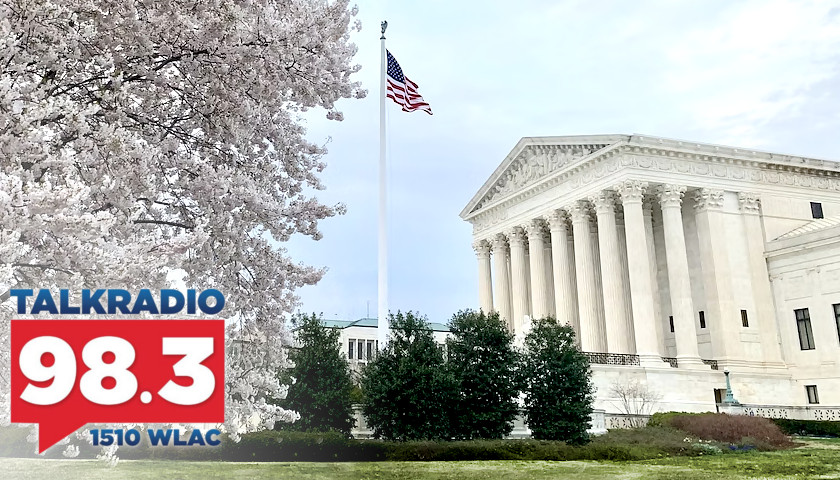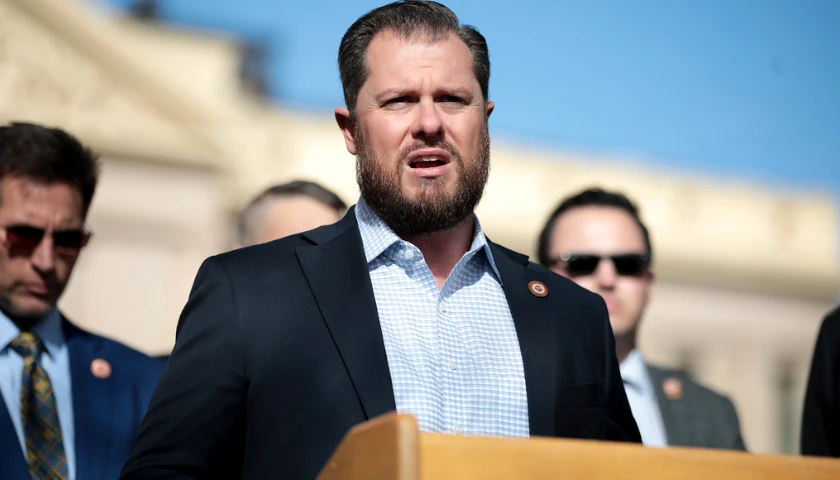Crom Carmichael – the original all star panelist – shared his insights on two recent Supreme Court decisions about the separation of powers and free speech during Friday’s edition of The Tennessee Star Report’s with Michael Patrick Leahy.
TRANSCRIPT
Michael Patrick Leahy: Ladies and gentlemen, without further ado, here is a Crommentary for Friday, June 30th, 2023.
Crom Carmichael: Michael, there are two recent Supreme Court decisions that are just kind of interesting.
And I could argue either side as to the goodness of the final case.
But it’s interesting.
One of them, the Wall Street Journal entitles it, “The ‘King’ and the Supreme Court,” and this is where Texas and Louisiana challenged the Biden Department of Homeland Securities guidelines that prioritized the arrest and removal of non-citizens in certain categories like suspected terrorists.
And then, they kind of said, ‘We’re not going to enforce the law for a whole bunch of other categories’ – which by far included almost all of the people who have been illegally coming across our border.
And the Supreme Court ruled in favor of the Biden administration.
Now, on one hand, I could say that this particular case, I don’t agree with the Supreme Court.
On the other hand, what this is doing is drawing a distinction between the powers of the executive branch and the Congress. And with a president who wants to reduce the size of government.
This ruling actually would be a good ruling, because it means that the executive branch’s decisions – which the president is the head of, the executive branch carries a lot of weight, and the courts have acknowledged that.
The other one is also quite interesting.
The Wall Street Journal is all thrilled with this particular one because the title is a resounding reaffirmation of Times v. Sullivan.
And this is a particular case and – I’m gonna just quote here very briefly – it’s Counterman v. Colorado flew under the radar for most Americans, even journalists. The case posed the question of what state of mind the government must prove to secure a criminal conviction for speech.
This constitutes a true, a true threat of unlawful violence. In deciding it, however, the sixth for the nine justices reaffirmed the central holding of the Supreme Court of the Sullivan case.
Now the Sullivan case said essentially the ruling was that and, and Justice Brennan’s opinion says it must be considered “against the background of our profound national commitment to the principle that debate in public issues shall be uninhibited, robust, and wide open.”
That’s the Sullivan case.
And what this is about is, can publishers – can the press – slander people unwittingly and avoid any penalty?
And then the next one is, well, can they slander them wittingly and avoid penalty?
And so what the Supreme Court did in Sullivan is, it raised an incredibly high bar so that you can attack a public official, almost without any constraints at all.
You can attack them, you can slander them, you can do whatever you want to to them, and they have no recourse if they’re a public, if they are a public official or a public person.
Clarence Thomas, to me, is a perfect example. And Clarence Thomas, by the way, is one of the justices who wrote a dissenting opinion in the particular case of Counterman v. Colorado because he personally was on the receiving end of slander by none other than Joe Biden.
When he was up for confirmation and he, even today, now, and at that case based on, based on the facts presented a reasonable person must conclude that Anita Hill made a false accusation in a written document to begin with.
But she did it secretly thinking that if Clarence Thomas didn’t withdraw – this is all in the record by the way – that if Clarence Thomas didn’t withdraw then, then, then her signed affidavit would not be made public. But then she was outed, and then once she was outed, she was forced to either go to jail for filing a false affidavit or testify before Congress and make up three stories that were completely unsupported.
By any fact, other than her statement, which in most court cases is inadmissible, but Clarence Thomas had no recourse, but he did get confirmed.
Well, now he’s being slandered again. The public and the media are up there; they’re saying things about him and what he did with a gentleman named Harlan Crow, a very good friend of his on how he didn’t report certain information.
But at the time he wasn’t required to report it, and so he didn’t. There are formal reports that you fill out. And if there’s not anything in the formal report to fill out on, on a subject, then there’s nothing. There isn’t any place in the report to even put it unless you wanna put a Post-it note on there.
And so now Clarence Thomas is being wrongfully attacked again, but there’s nothing he can do about it. And so I’m really ambivalent nowadays over the Sullivan decision because I believe that there are many people in the media and many, and many people in – well, I’m just gonna stick with the media.
Many people in the media who read the daily talking points and then repeat them, and knowing – knowing – that they cannot be held to account and that their organizations can’t be held to account.
I think now, giving the media no constraints on just misinformation and outright lying about public officials because they are partisan in nature.
I think that the media actually, private media, should be held to account.
Michael Patrick Leahy: that note, we thank you Crom for your Crmmentary for Friday, June 30th, 2023.
– – –
Tune in weekdays from 5:00 – 8:00 a.m. to The Tennessee Star Report with Michael Patrick Leahy on Talk Radio 98.3 FM WLAC 1510. Listen online at iHeart Radio.








